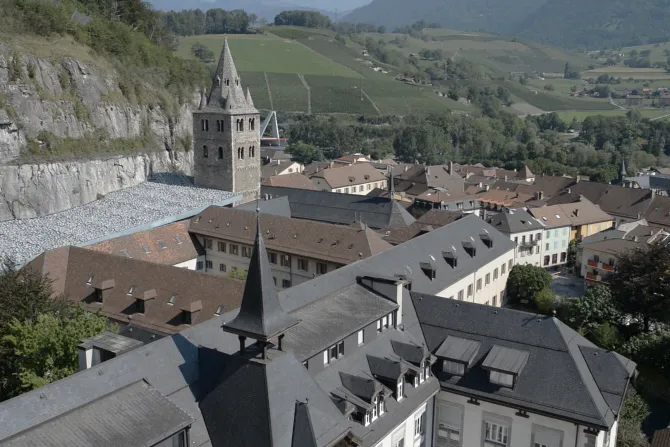With over 1,500 years of history, the Abbey of Saint-Maurice in the Valais region of Switzerland is the oldest monastery in the West to have remained in continuous operation since its foundation in 515. The building stands on the site of St. Maurice’s martyrdom, celebrated on Sept. 22.
Chronicles tell us little about St. Maurice and his companions, who were killed around 300 A.D. “We know that they died here, that according to tradition they were members of the Legion of Thebes, i.e. from Africa, and that they were martyred for their refusal to obey the emperor’s impious orders,” archivist and librarian Canon Olivier Roduit explained to CNA.
A text dated back to year 430, La Passion des Martyrs d’Agaune (The Passion of the Martyrs of Agaune), written by Bishop Eucher of Lyon, had a major influence, helping to spread the cult of these martyrs throughout Europe and the rest of the world. Numerous villages in Switzerland, France, and Italy bear the name of St. Maurice, and there are more than 1,000 places dedicated to the saint worldwide.
Around the year 380, Theodule, the first known bishop of the Valais region, found the relics of the martyrs under the cliff and built the first church in their honor, as stated on the website. King Sigismund then founded the abbey in 515, instituting perpetual prayer on the site.
“Saint-Maurice is above all a place of passage,” Roduit explained. “It is located on an important international route, the Via Francigena, which runs from Canterbury to Rome.” The abbey’s influence was particularly strong in the 12th and 13th centuries. Kings and princes offered gifts, which today constitute a precious “treasure” jealously guarded by the canons.
In 1262, King St. Louis IX presented the abbey with a thorn from the crown of Christ. “The king wanted to spread the ideal of the military saint in his kingdom,” Roduit said. “The abbey gave him relics of St. Maurice and in exchange, the king offered a small thorn from the crown of Christ.”
Despite the French Revolution, fires, and falling rocks, the abbey was rebuilt but never interrupted. Since 1128, the abbey has been run by canons who follow the Rule of St. Augustine. “Our main mission is to worship the Lord at the tomb of the martyrs, faithfully since the beginning of time,” the archivist insisted.
One kilometer from the abbey is the Martyrdom Chapel. Built in the 18th century and renovated in the 20th, it stands on the exact site of the martyrdom. Its blood-red altar bears an inscription taken from the Passion of the Agaune Martyrs by Eucher: “We are your soldiers, O Emperor, but above all servants of God. We owe you military obedience, we owe him innocence.” According to the story, Maurice added: “We’d rather die innocent than live guilty.”
Canons’ missions
Today, there are 27 canons in the entire congregation, 22 of whom live at Saint-Maurice, hailing from several places: Valais, German-speaking Swiss, France, and Bavaria. The young people in formation are of Sicilian, Beninese, Togolese, Burkinabe, and Kazak origin.
The canons have three main ministries, beginning with education. They teach at the Lycée-Collège de l’Abbaye de Saint-Maurice, an institution of 1,200 students founded in 1806 under an agreement with the State of Valais.
They also minister in neighboring parishes, and — especially in the last century, given the dwindling resources nowadays — carry out missionary work, notably in India, Peru, Kazakhstan, and the Democratic Republic of Congo. Until the end of the 20th century, they carried out the famous Sikkim mission, in the Darjeeling Diocese in northeast India between Nepal and Bhutan.
The abbey’s influence
Before the COVID-19 pandemic, some 100,000 people visited the abbey every year. And approximately 15,000 visitors came to see the Treasure Museum. The abbey’s international reputation continues to grow, as the audio guides are now being translated into Ukrainian and Russian.
The Saint-Maurice Archives house an extensive medieval collection, with the first document dating back to 984. Their holdings have been fully digitized and made available to researchers on the Internet.
The canons also run a project to develop an organ culture in French-speaking Switzerland, with an organ school, a music season, and an international organ competition. Saint-Maurice is also home to Switzerland’s largest carillon (a bronze set of bells played with a keyboard), which will celebrate its 20th anniversary in 2024.
The canons run a brewery — the Abbey of Saint-Maurice Beer — and maintain a 6-hectare vineyard, with which they will soon inaugurate Cuvée de Noé, a sweet dessert wine.
Every Sept. 22, the feast of St. Maurice is a highlight in the region. The canons organize a procession with the saint’s relics through the streets of the town and a three-day Monastic Market, attended by some 30 religious communities from France, Switzerland, and Italy.
The abbey is currently under the authority of Prior Roland Jacquenoud, since the Father Abbot of Saint-Maurice, Monsignor Jean Scarcella, elected in 2015, has stepped down pending the completion of an investigation requested by Rome following allegations of sexual abuse and cover-up aimed at various members of the Swiss Bishops’ Conference.
By Anna Kurian



Leave A Comment